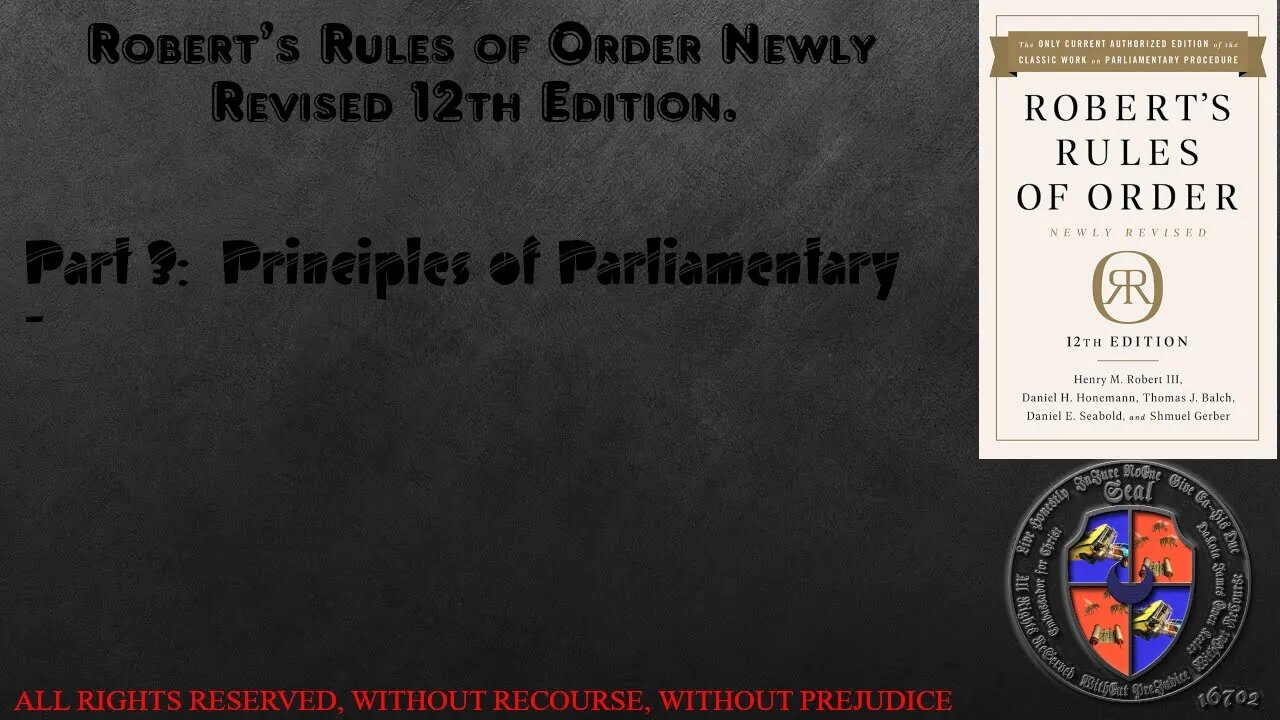Premium Only Content

Principles of Parliamentary Law
In this short video we touch on the fundamental principles of parliamentary law.
Dakota James Owen Keeler
(616) 329-5785
DakotaJKeeler@protonmail.com
PayPal: Bearzrobotics@gmail.com
BTC: bc1qeqk2mfkxr9ljewu44rr44sns5acjwgju7yems2
The Rules of Parliamentary Procedure as laid out in RONR 12th ed are based on the weighing of the interest of the rights of individuals and subgroups in the organization.
of the majority,
of the minority, especially a strong minority—greater than one third,
of individual members,
of absentees, and
of all these together.
The means of protecting all of these rights in appropriate measure forms much of the substance of parliamentary law. The need for this protection dictates the degree of development that the subject has undergone.
Parliamentary Law allows for a group of people to effectively empower their leadership while maintaining the degree of control over the body that they see fit.
Ultimately the general will is based of the majority vote of the body. However this action is only taken once the minatory has had the opportunity to make a case for and convince other of the other path in a full and free discussion. Only a Two-Thirds majority can silence any member and deny them the right to speak. -- However this shouldn’t be over used. A minority that doesn’t feel like they had a fair chance to state their side will not submit to the general will. It could either fraction the organization at beast or lead to members half assing putting the general will into effect.
In this connection, there is an underlying assumption of a right that exists even though it may not always be prudent or helpful for it to be exercised.
The next major point to protect against fluctuation in attendance. Thus RONR requires you to have more votes to change something previously adopted than to adopt it in the first place.
Fundamentally, under the rules of parliamentary law, a deliberative body is a free agent—free to do what it wants to do with the greatest measure of protection to itself and of consideration for the rights of its members.
The application of parliamentary law is the best method yet devised to enable assemblies of any size, with due regard for every member’s opinion, to arrive at the general will on the maximum number of questions of varying complexity in a minimum amount of time and under all kinds of internal climate ranging from total harmony to hardened or impassioned division of opinion.
-
 1:13:16
1:13:16
Patriots With Grit
2 hours agoThe Comedy of White Privilege & Government | A.J. Rice
8.27K -
 49:40
49:40
Havoc
6 hours agoWhat's 2025 Looking Like... | Stuck Off the Realness Ep. 23
30.4K2 -
 3:58:11
3:58:11
Nerdrotic
6 hours ago $25.92 earnedWOKE Hollywood Freak out, Cyber Truck Attack, 2025 BEGINS! | Friday Night Tights 335 w Benny Johnson
87.7K16 -
 25:07
25:07
Adam Does Movies
4 hours ago $0.64 earnedTOP 10 BEST MOVIES OF 2024!
12.8K1 -
 1:24:53
1:24:53
Edge of Wonder
6 hours agoCIA Experiments With Mysterious Fog: Poison ‘Smart Dust’ Bioweapons?
13.7K16 -
 LIVE
LIVE
xBuRnTx
2 hours agoLet the weekend begin! #fortnite
38 watching -
 2:38:35
2:38:35
Twins Pod
13 hours agoBlack People... We Got A Problem... | Twins Pod - Episode 46 - Tommy Sotomayor
92.2K64 -
 1:23:52
1:23:52
Omar Elattar
5 hours agoSocial Media Expert: "How To Get 48 Million Views Per Week!"
37K3 -
 1:11:21
1:11:21
Sarah Westall
3 hours agoFake or Real Alien Invasion, Military Advanced Craft & UFO Research: Laura Eisenhower, Patty Greer
14.2K3 -
 1:52:29
1:52:29
2 MIKES LIVE
6 hours ago2 MIKES LIVE #162 Open Mike Friday! Johnson is IN!
11.9K2